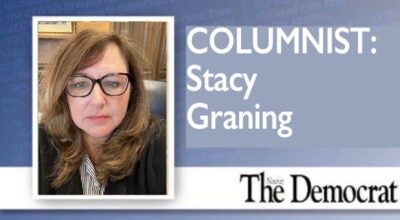Register for climate change course
Published 12:24 am Sunday, January 14, 2018
The Earth’s climate is changing.
But amid all the controversies over humanity’s role in present day changes in the earth’s climate, one thing is agreed upon by all — the earth’s climate has been changing as long as it has had a climate to be changed. Sometimes faster, sometimes slower, but changing nonetheless. The very climatologists who by a large majority warn us about human-caused global warming today are the ones who have detailed for us the natural reasons for shifts between warmer and cooler, wetter and drier, stormier and less stormy climates in the past. Our species was born into the midst of those changes, and to a surprisingly large degree, has been shaped by them.
Sorting out the hard science behind the present day debate is way beyond my pay grade. I am no climatologist. But over the past generation, an impressive and ever-growing anthropological and historical literature has examined the impact of those transformations of yesteryear on human societies — in both prehistoric times, and over the course of more than five thousand years of civilization. Where the fossil record and the historical record are bare, paleo-climatologists — relying on “proxy data” from ice cores, lakebed sediments, tree rings, etc. — can now track fluctuations in rainfall and temperature over the course of tens of thousands of years. These fluctuations made the difference between drought and flood, shorter or longer growing seasons, and so, between good and bad harvests. In pre-industrial, overwhelmingly agricultural societies such changes determined the likelihood of famine or plenty. And that could help to determine the difference between rebellion or order, war or peace, the fall or the rise of dynasties and empires. It is not in any way an exaggeration to say that often, the “natural forcings” of climate change — such as orbital wobbles, solar cycles, and volcanic eruptions — have done as much or more to shape human affairs than have kings and generals.
So, let’s take a pause from the arguments about current climate change, and see what we can learn from the work of scholars about past climate changes and their role in influencing the course of human history. As part of its Special Interest Series, Copiah-Lincoln Community College will offer a seven-week non-credit class entitled, “The Prehistory and History of Climate Change.”
In Week One, we will take a layman’s look at those natural reasons for climate change. Week Two will show how those changes shaped the development of our species in prehistoric times. Week Three will show us the degree to which the invention of agriculture and the creation of civilization were influenced. Week Four will take us through Ancient and Medieval Times, with the fall of Old Kingdom Egypt, the rise and fall of Rome, and the collapse of the Classical Mayan civilization, and more. Week Five will cover the Little Ice Age of the 14th to the 18th centuries. In Week Six, we take a closer look at how different societies dealt with the climate-related “Crisis of the Seventeenth Century,” from Tokugawa Japan to Jamestown, Virginia. And in Week Seven we will sum it all up, and see how the past provides crucial context for present day debates.
The class will be from 5:30 to 6:30 p.m. on Tuesdays, Jan. 16 through Feb. 27, in the theater of the Convention and Visitors Bureau on Canal Street.
There is a $45 fee. All are welcome.
Please register in advance by contacting Emily Edwards at Co-Lin, 601-446-1103, emily.edwards@colin.edu.
Jim Wiggins will be the instructor for the Copiah-Lincoln Community College special interest course, “The Prehistory and History of Climate Change.”





